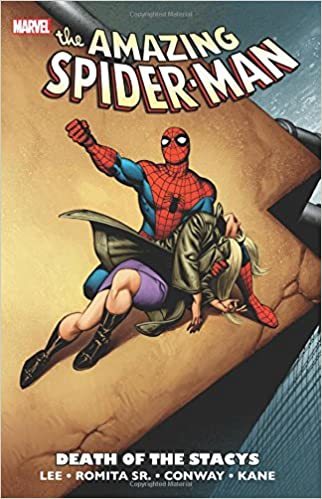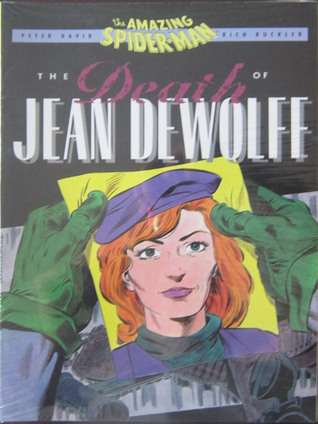Monthly (Comic) Book Club - February - Watchmen13817
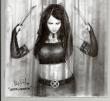 If the viagra is working you should be well over a 9.8. If the viagra is working you should be well over a 9.8.
|
xkonk private msg quote post Address this user | |
Quote:Originally Posted by dielinfinite To be fair, I think there are ways you could have it turn out. Public opinion went against masks, HJ won't play along with Congress, the government quietly sends Comedian to look into it, etc. But it doesn't jump out to me as especially plausible. Quote: Originally Posted by dielinfinite I went and gave the issue 2 Under the Hood a re-read. It does say that Comedian became a war hero in the Pacific, so he definitely went overseas. Otherwise I don't think there's a clear mention. It doesn't sound like any of the other Minutemen went or why they may have decided one way or the other. It also mentions that Moth Man started in Connecticut, and that within a year of HJ becoming public knowledge "there were at least seven other costumed vigilantes operating on or around America's West Coast". So maybe they started spread out and then all congregated to New York? It also says that the team had a hard time keeping momentum because there weren't that many bad guys who put on, or stayed in, a costume, so maybe it was just the same in other cities. No costumed bad guys, no costumed good guys. Describing the new heroes coming into public view, it describes Comedian as particularly brutal and vicious. So maybe he was an earlier starter than I gave him credit for. |
||
| Post 51 • IP flag post | ||
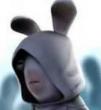 COLLECTOR COLLECTOR
|
dielinfinite private msg quote post Address this user | |
Quote:Originally Posted by michaelekrupp Oh I certainly believe it is something he would want to do but I feel the significant time gap and the events of the intervening years (he apparently fought in WWII’s Pacific theatre) makes it seem unlikely that it’d be something he would actively pursue after so long. As @xkonk pointed out there are certainly ways it could happen but either way it requires extrapolation from very limited information so there is no right or wrong so while I do find it a compelling link, I am not convinced. I am planning to have a post-mortem to discuss the format after this month is over but I will take a moment to address some of your concerns. I am really liking the current format thus far because it takes a portion of the story and gives it its moment in the discussion for us to really tear it apart. I mean, would we really be discussing Rorschach’s sugar cubes if we were taking on the whole of the story at once? If you would prefer to approach the reading as you suggested, that is already built into the current format. Simply stop by on the last week of the discussion. As each week builds upon the week before and encourages readers to connect the current reading with what we have discussed and become familiar with the previous week, the scope of the discussion grows. On the last week we are spending a week discussing the current reading and everything that came before. As for Dark Knight Returns, it was not rejected outright but as an effort to encourage reading and exploration of new and different comics, following a critically acclaimed dark deconstruction of super hero comics and archetypes from 1986 immediately with a critically acclaimed dark deconstruction of super hero comics and archetypes from 1986 seems more than a little redundant. There is certainly much to discuss around Dark Knight Returns, it is a favorite of mine and I can’t imagine that it won’t eventually get its turn, but I don’t think it serves this effort’s purpose to spend so long on works stemming from so similar a point in time in the history of comics |
||
| Post 52 • IP flag post | ||
 COLLECTOR COLLECTOR
|
dielinfinite private msg quote post Address this user | |
| @xkonk Those are some great details I had overlooked! I think the line about west coast heroes just slipped my mind since he almost immediately goes on to talk about other heroes we’d spend more time with. I imagine it was more that there were certainly OTHER heroes but Under the Hood is very much from Hollis’ point of view so it would make sense that the people he’d interacted with were mostly local. So while there are definitely more heroes in this world than we actually see, the scope of the story doesn’t really touch on them. Which makes sense but what he did develop is so compelling that it makes you wonder “hey, what’s over there?” I feel a little silly forgetting the Comedian fought in WWII since the book includes a photograph of him from his time there. I did find the snippet that I was thinking of but it ended up being in one of the flashbacks and not Under the Hood. It was the Comedian chomping at the bit to go to war and Hooded Justice insisting the group should avoid political situations and Mothman commenting that he’s afraid of the thought, which might explain why more heroes, at least the ones the book focuses on, didn’t fight in that particular war. 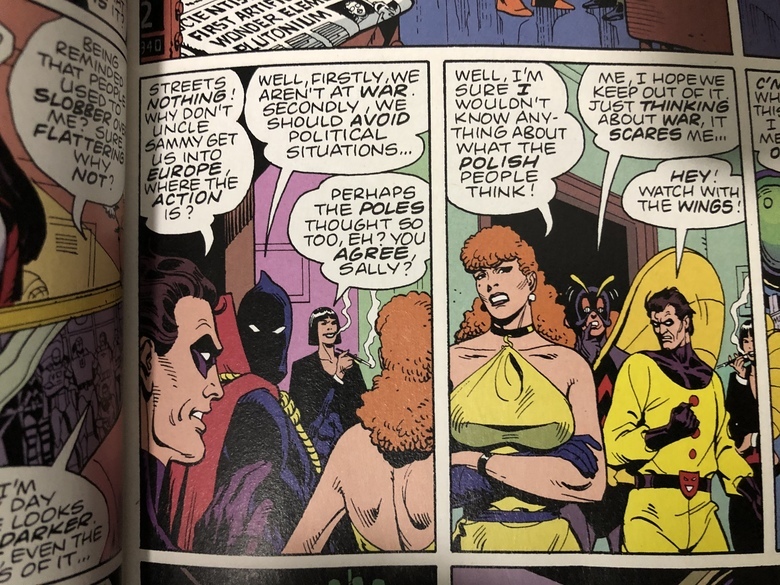 |
||
| Post 53 • IP flag post | ||
 COLLECTOR COLLECTOR
|
dielinfinite private msg quote post Address this user | |
| The two nominees this week had an equal number of votes so decided by coin flip is: Quote: Originally Posted by xkonk So March is essentially a 5-week month so I'm adding a few issues in keeping with the month's theme of significant death's in Spider-Man's life Wk1 (3/1-3/7): Amazing Spider-Man 88-90 Wk2 (3/8-3/14): Amazing Spider-Man 91-92, 121-122 Wk3 (3/15-3/21): Spactacular Spider-Man 107-108 Wk4 (3/22-3/28): Spectacular Spider-Man 109-110 Wk5 (3/29-4/4): Amazing Fantasy 15, Spider-Man vs Wolverine, Amazing Spider-Man 400 |
||
| Post 54 • IP flag post | ||
 If the viagra is working you should be well over a 9.8. If the viagra is working you should be well over a 9.8.
|
xkonk private msg quote post Address this user | |
| And we're reading Watchmen 4-6 this week? | ||
| Post 55 • IP flag post | ||
 COLLECTOR COLLECTOR
|
dielinfinite private msg quote post Address this user | |
Quote:Originally Posted by xkonk Yes, sir! |
||
| Post 56 • IP flag post | ||
 COLLECTOR COLLECTOR
|
dielinfinite private msg quote post Address this user | |
Week 2 (2/8-2/14): Issues 4-6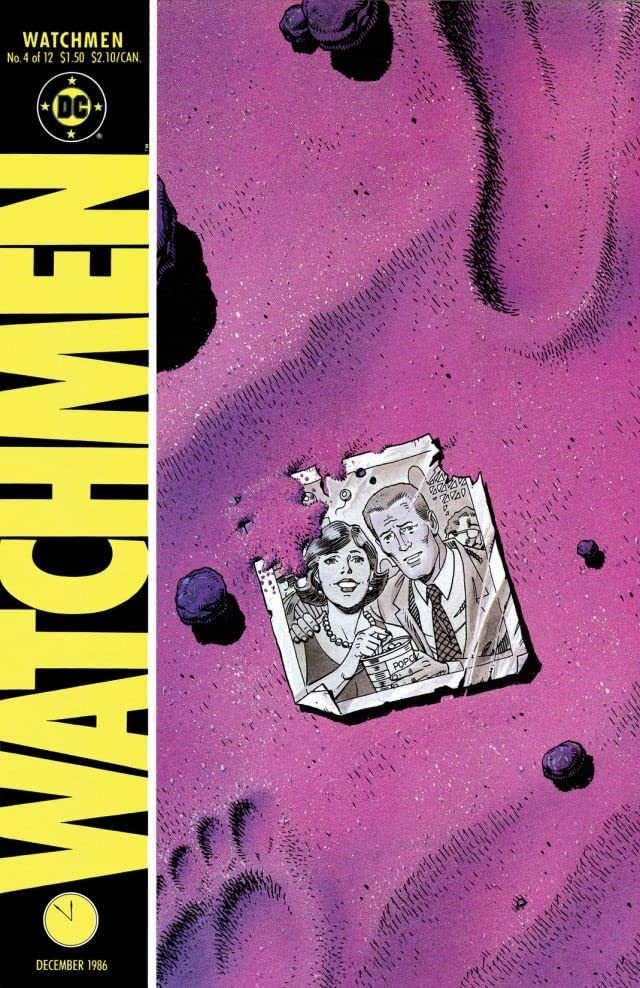 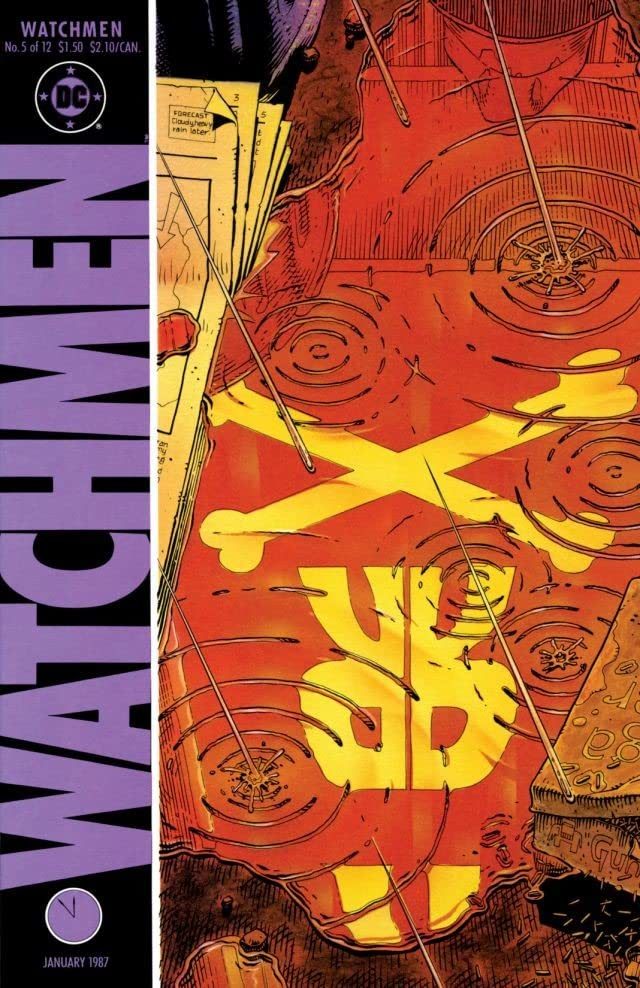 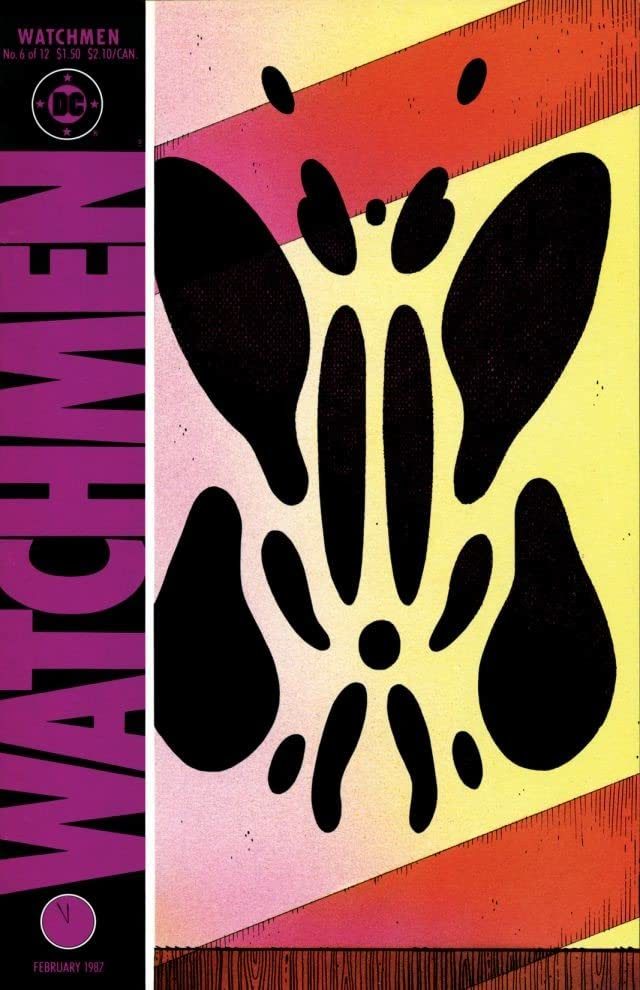 |
||
| Post 57 • IP flag post | ||
 COLLECTOR COLLECTOR
|
dielinfinite private msg quote post Address this user | |
| Issue 4 This covers the first 20 or so pages of the issue. It’s getting late so I’ll wrap up the issue tomorrow. I think this may be one of my favorite issues of the series. I love these histories that span decades where you get another view at events previously mentioned and other glimpses into how the history of Watchmen differs from ours. One thing that is immediately noticed is that all of Dr Manhattan’s narration is in the present tense; a glimpse into how Dr Manhattan perceives the world around him I also noticed that this time, the cover is a detail of the second frame of the story instead of the first. Not sure what exactly the significance, if any, of that is. At the beginning the theme of fundamental order and certainty in the universe and on earth represented by the watch. Once the nuclear age begins and the malleability of time discovered order is destroyed and the watch is obsolete. Jon’s co-worker at research facility brings up how a genius like Einstein still has issues with understanding women, reflecting Dr Manhattan’s own troublesome relationship with Sally. Jon takes it as a sign of Einstein’s humanity. Is it also a sign of Dr Manhattan’s humanity despite how different he is now? Or is it meant to highlight Dr Manhattan’s lack of humanity? When they first meet, Janey mentions that Jon is replacing someone that died from a tumor. Seeing as they are working with radiation it seems likely that the two are related, especially in light of the cancer revelations in the last issue. Jon mentions that it seems other people are making his decisions for him, almost as if he has no say in his own life or that it is somehow pre-destined or decided. Combined with the present tense narration it makes it feel like his life, and by extension the entire universe has already been decided and that the future is just as concrete as the past and present. The 9 panel structure is effective at building suspense as Jon’s accident approaches. The frames maintain a very regular and orderly pace, despite the terror of those witnessing the events in the story, giving it a feeling of inevitability. This issue turns what seemed like a straightforward, noir-ish murder mystery into a science fiction story. Even after he comes back, Jon’s life still doesn’t feel like his own. The government is deciding what he will be just like his father decided for him when he was younger. We briefly see the charity event Mason briefly mentioned in Under the Hood where all the old heroes met Dr Manhattan. Dr Manhattan’s crimefighting is violent but unlike the Comedian’s, who is violent because he enjoys it, Dr Manhattan is violent because he can’t understand it. During his meeting with Kennedy Dr Manhattan specifically mentions that Kennedy was killed by two shots, referring to the two-shooter/grassy knoll theory of his assassination. The opening montage of the film suggests it was the Comedian on the knoll but no such suggestion seems to be made here. When Dr Manhattan speaks to Mason at his retirement, Mason mentions that feeing of obsolescence that he would later include in Under the Hood. Mason brings up that he understands how cars work, suggesting the same certainty and order Jon’s father had felt with the watch and just like the watch, Mason’s knowledge of cars may soon become obsolete with the advent of electric cars. The idea of his life and the world around him being out of his control becomes cemented after the Kennedy assassination. Despite knowing it would happen, Dr Manhattan did not stop it because to him it already happened and thus could not be changed. It is difficult to really wrap your head around what kind of existence Dr Manhattan experiences and whether he (or anyone really) has any free free will at all. At the same time, like Janey, we have to question if he had the capability to act but chose not to, is the world really set in stone? Despite the story being told to us chronologically, Dr Manhattan keeps mentioning the glass of beer, Janey packing up, and the photograph at his feet , among other milestones out of time from where we are experiencing them, as if they are all happening at the same time and each every time we see them repeated it is just our perception of time reaching that signpost. When Dr Manhattan meets the Comedian in Saigon, the Comedian is with a woman who could easily be the one he would later kill. It’s interesting that Dr Manhattan points out the Comedian’s amorality. At the same time I wonder if Dr Manhattan recognizes his own amorality stemming from his growing lack of detachment from humanity. |
||
| Post 58 • IP flag post | ||
 If the viagra is working you should be well over a 9.8. If the viagra is working you should be well over a 9.8.
|
xkonk private msg quote post Address this user | |
| Issue 4: following on what @dielinfinite said, it's interesting to get Manhattan's internal monologue. He seems so removed from humanity, with his trouble understanding others, but he still obviously has some. In the earlier issue he sits and looks at Laurie's bra, and here he stares at the old picture. If he didn't have thoughts and feelings, why would he? He gets pulled along by his train of thought like anyone else, thinking about stars to thinking of how fast their light travels to thinking of light going to Pluto to thinking of what he'll be doing in 2 hours. It's unclear if he keeps all those thoughts in his head constantly or if he just has access to them and he knows when he thinks about it. Like, is he somewhat omnipresent or is the future like a memory to him? Janey commenting on Jon being young for a research scientist struck me as a little funny because physics and math are typically seen as a young man's game. Looking just at some people related to the Manhattan project, Oppenheimer was head of Los Alamos at just 40, Einstein had his 'miracle year' at 26, and Fermi was under 40 when he did most of his nuclear work. Fermi's first important work was done 10 years before that. Not that there aren't plenty of older success stories as well, just a little odd to me. Another science snafu: Manhattan says Mars doesn't have seasons, but it does. Maybe I'm misinterpreting the panel, but the one about the flutter of a pulse in Janey's belly makes me think she should be pregnant in mid-1959. But in the panels at Christmas she isn't showing, and it never comes up. I guess they just meant her own pulse? Going back to Manhattan's sense of time and events, I wonder if that changed with time or not. He still seems fairly human early on with Janey but by November he's exploding people and says he doesn't understand the morality of it. Again in the 'kinda funny' camp, the mention of electric cars was somewhat prescient. I don't know if electric cars are any harder to service than gasoline cars but I've heard that people do much less of their own maintenance now because of the computer systems. I don't think that was the case yet in 1985 though. Does Manhattan actually feel an attraction to Laurie or does he just think that he should be with her because that's what happens in his future? On Mars he says that he turns away from the stars because he doesn't want to look at dead things, but does he actually 'want' or is that what he does? Manhattan obviously interprets external events as fixed, but what does he feel about himself? If Wally Weaver died of cancer, and he doesn't seem to have spent much time with Jon after he became Manhattan, does that mean that maybe Janey didn't get it because of him? Or maybe being in the room when he fully reformed his body was enough? Or maybe it's a coincidence? I guess the last couple pages sum up the morality part for Manhattan. Since everything that has happened or will happen is already set, the only morality involved is from whoever created everything and set it in motion. But he doesn't even know if there is such a being. But he still ascribes morality to others (or the lack of it, at least, for the Comedian). Manhattan is a bit contradictory. Milton Glass' sentence about Manhattan's creation being 'certainly unrepeatable' makes me wonder how many other people the Pentagon disintegrated while trying to make another Manhattan. I didn't think about it until I was reading Glass' excerpt, but it's kind of interesting that Manhattan went ahead and made lithium batteries and whatever other things were needed for the early technological advances in the book. In the Marvel and DC universes, people basically still live in New York and wherever else while Tony Stark flies around in however many suits he can think of and Wonder Woman has an invisible jet. I've always thought that any real-world discussion of superheroes would have to include their failure to materially improve the world as their largest failing, but apparently Manhattan didn't go the same route. |
||
| Post 59 • IP flag post | ||
 COLLECTOR COLLECTOR
|
dielinfinite private msg quote post Address this user | |
| @xkonk lol I’m at work and won’t be able to finish the issue until later tonight so I’m trying not to look too far ahead in your comments. Regarding Dr Manhattan’s sense of time time developing, I certainly think it is something he grew into somewhat. I recall in one frame of the flashback he comments that he feels like he might’ve been there before almost as if his cosmic awareness hasn’t yet fully solidified. The case with Wally caught my attention as well. I think he was mentioned among the news report in the previous issue about cancer deaths connected to Dr Manhattan. I agree that he didn’t seem to spend too much time with Dr Manhattan but it also got me thinking about Jon’s predecessor at the lab who died, most likely, of cancer and that was before Dr Manhattan was even created. I’ll have to look back at the list of cancer cases the news report pinned on Dr Manhattan. I know they weren’t all researchers at the Arizona facility but at least Wally and Janey were. |
||
| Post 60 • IP flag post | ||
 If the viagra is working you should be well over a 9.8. If the viagra is working you should be well over a 9.8.
|
xkonk private msg quote post Address this user | |
| Issue 5: Rorschach leaving the note in Moloch's fridge, basically just to mess with him, is super creepy. While he has some manner of code, unlike the Comedian, his cruelty isn't all that different. The one police officer's take that the media inspires boredom seems quaint these days. In Dan and Laurie's conversation, I guess there's an error in the top middle panel? The speech balloons don't point to them. Or I guess we're seeing their reflection, like in the last panel of that page, but I'm not sure I see the need for it. Makes it more confusing. I hadn't noticed the last panel on page 12 before. Takes new meaning if you've read the whole series already. Rorschach in this issue gives a very "Bruce Wayne is Batman's mask" vibe. It feels like this issue is much more plot than the previous one, which was much more (entirely?) character development. Maybe it's setting up a pattern: plot (issue 1), character (issue 2), plot (issue 3), character (issue 4), plot (issue 5)...? |
||
| Post 61 • IP flag post | ||
 If the viagra is working you should be well over a 9.8. If the viagra is working you should be well over a 9.8.
|
xkonk private msg quote post Address this user | |
| @dielinfinite work has been fairly slow for me for a while, so I'm happy to barge ahead on Mondays :-) | ||
| Post 62 • IP flag post | ||
 COLLECTOR COLLECTOR
|
dielinfinite private msg quote post Address this user | |
Quote:Originally Posted by xkonk Me avoiding spoilers (yes I’ve read it before) 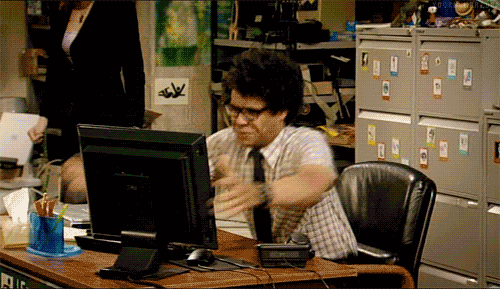 In the meantime, I’ll share some Watchmen items from my collection This Rorschach sketch I got at Comic Con. I was first in line at the Gibbons signing but since I didn’t know it was happening I hadn’t brought anything with me. I bought a print that they were selling and he knocked out the sketch for me for being first. It is now waiting for CBCS’ magazine-sized slab so I can get it with an ART label 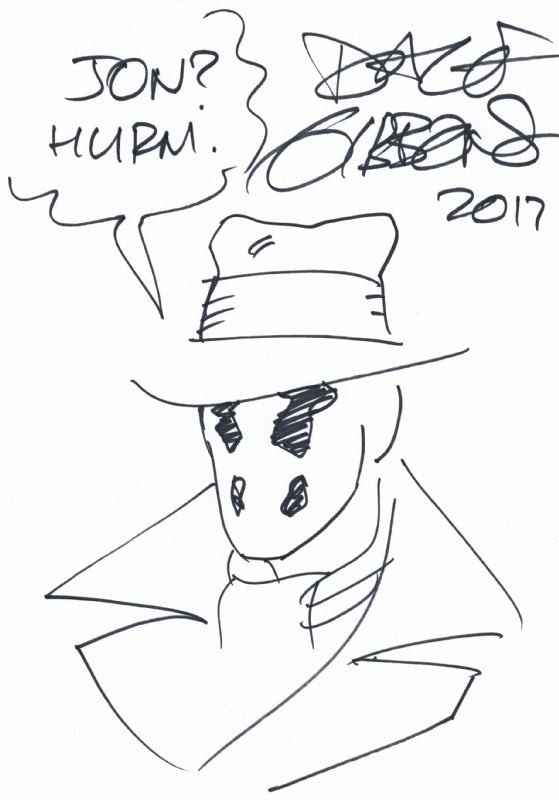 I love this Comedian cover by Tim Bradstreet. So far it is signed by him and writer Brian Azarello but I’d still like to get Jeffry Dean Morgan who did a lot of Walking Dead shows before Covid. The last person I want to get is Thomas Jane. He played the Punisher but was apparently the first choice to play the Comedian in the movie but couldn’t do it. Jane was also Bradstreet’s model for the cover! 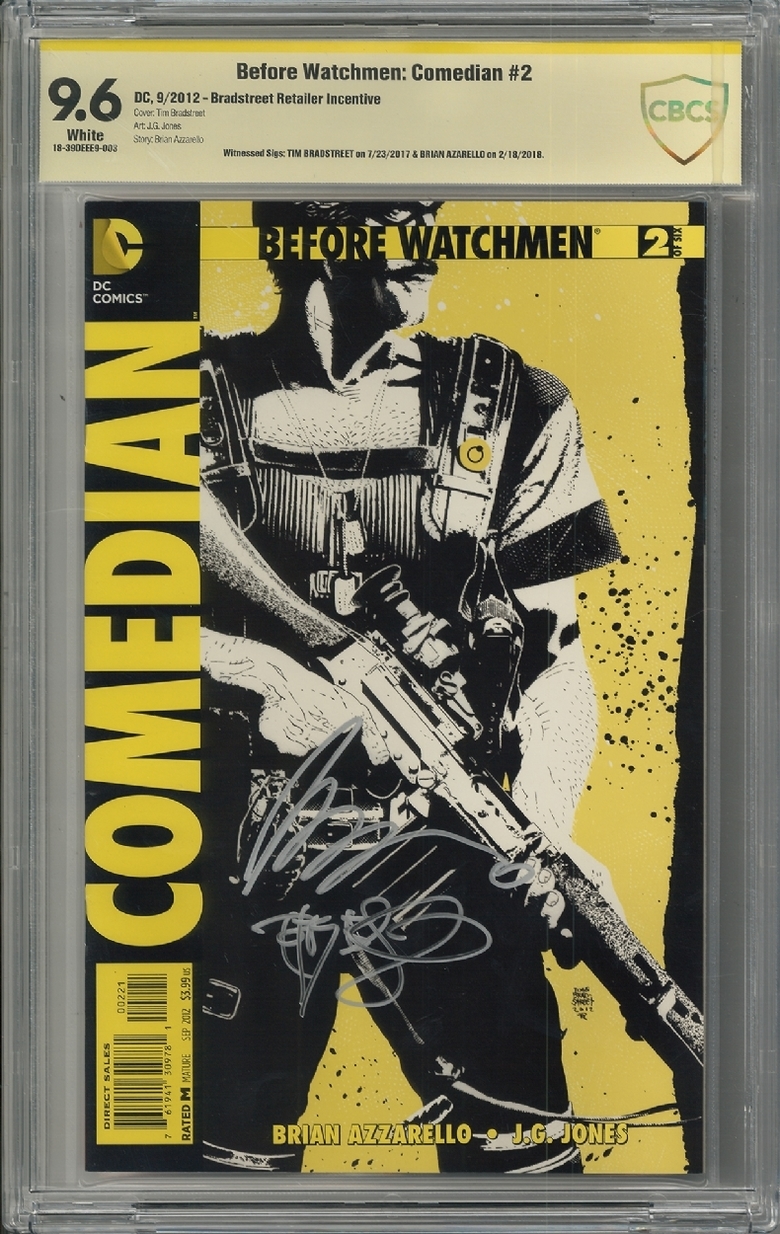 |
||
| Post 63 • IP flag post | ||
 If the viagra is working you should be well over a 9.8. If the viagra is working you should be well over a 9.8.
|
xkonk private msg quote post Address this user | |
| Issue 6: we do indeed get another character issue, this time giving us more on Rorschach. We've gotten deep dives on the histories and internal lives of Rorschach, the Comedian, and Manhattan, but not really Laurie, Dan, or the other less "damaged" crimefighters. Hollis Mason we got from his book excerpts but even that mostly served to tell us about how bad the other "good guys" were. The events of the story would be bad either way, but framing it through these characters makes it extra gritty and depressing. Malcolm Long's wife talking about him makes you wonder why Mal got the case. He doesn't sound like a guy who works with a lot of hardened criminals, or many criminals at all. As a PSA on Kitty Genovese: while her story is held up as the prime example of the bystander effect (people in crowds are less likely to be helpful than people alone or in smaller groups), the original reporting of her attack was pretty inaccurate. Which doesn't make the following research on it less accurate, but it's an interesting tidbit https://en.wikipedia.org/wiki/Murder_of_Kitty_Genovese#Accuracy_of_original_reports Rorschach makes it pretty explicit that he believes in the "Bruce Wayne is Batman's mask" idea for himself. Rorschach lays out his view of the universe for us to contrast with Manhattan: while Manhattan sees the world as created and set on a course, Rorschach sees that we make our choices and do things. Manhattan commits violence because it already happened and there's no decision to be made and thus no morality; Rorschach does it because other people chose to be bad and he is imposing his own morality on the world. The end of the issue again makes me wonder why Malcolm was chosen to work with Rorschach. He's apparently completed unsuited for it. He interviews Rorschach for three days and it destroys his worldview and wrecks his marriage. Looking at the dates on his notes makes you wonder about his wife though. Who blows up like that after two or three evenings? The whole thing is weird. The 'Nerertheless' typo in the police history is an odd one; r and v aren't that close to each other on the keyboard. |
||
| Post 64 • IP flag post | ||
 Collector Collector
|
michaelekrupp private msg quote post Address this user | |
| One final comment on the Comedian/ Hooded Justice thing. At the time HJ refused to reveal his identity, Blake was a government operative. He had the resources to find out who HJ really was and the personal motive to eliminate him. But you guys are probably right. Somehow I am sure that the American government would NEVER have anyone whacked and then blame it on “the communists”. I will try to re-read issues 4-6 tomorrow and give some input on those issues specifically (while doing my best to avoid discussing anything taking place beyond those issues). |
||
| Post 65 • IP flag post | ||
 COLLECTOR COLLECTOR
|
dielinfinite private msg quote post Address this user | |
| Xkonk said as much Quote: Originally Posted by xkonk And I agreed that it is certainly a possibility but added that I didn’t think it was likely the case |
||
| Post 66 • IP flag post | ||
 If the viagra is working you should be well over a 9.8. If the viagra is working you should be well over a 9.8.
|
xkonk private msg quote post Address this user | |
| @michaelekrupp Yeah, I would agree that it seems like something the Comedian would do. I didn't have the interpretation that he actually did it myself, but I also didn't put much thought into HJ since he isn't all that important to the story. Hollis' book mentions that Comedian was notably injured by a knife about a year after he left the Minutemen; maybe that involved HJ somehow? That seems more likely to me just because of the proximity in time, but if it was HJ then he won that round, too. | ||
| Post 67 • IP flag post | ||
 COLLECTOR COLLECTOR
|
dielinfinite private msg quote post Address this user | |
Quote:Originally Posted by xkonk I went back to the news reporter’s accusations and it’s definitely less cut and dried than he thinks it is. He mentions Wally, Janey, and Moloch. Of the three, Wally and Janey both worked at the Gila Flats research facility where Jon’s predecessor who likely died of cancer also worked, though I guess the lynchpin of America’s national defense is a far sexier than a long defunct physics lab in the middle of the Arizona desert. I do like how the wider panels when Doctor Manhattan reveals his structure emphasize the structure’s scale. Quote: Originally Posted by xkonk This reminded me a little about the scene in Robocop 2 when OCP is trying to create a second Robocop. Like in that scene, I don’t think that making another Doctor Manhattan is necessarily impossible, the accident certainly seems repeatable enough. Instead, I think the reason is the man. Glass mentions that the accident basically left an electro-magnetic consciousness but Jon had to put himself back together and he even mentions that it’s about how he puts himself back together with the narration laid over an image of the watch-pieces. I imagine that, had Jon not been a watchmaker, had that idea of everything having a place and a use imbued in him as a young boy he might not have had the will to put himself back together. I also find his reassembly a bit interesting as it feels like this might have really been a moment where he was actually in control of his life. Putting himself together was a feat of will. It took months to accomplish and no one was making that choice for him like in so much else in his life. Quote: Originally Posted by xkonk That is an interesting thought and made me think of Squadron Supreme by Mark Gruenwald. It’s an interesting read, sometimes called Marvel’s pre-cursor to Watchmen as it was released shortly before (a year to the month, actually) Watchmen and asked some similar questions. In it, the titular super hero team basically decides that with all their power they should not be responding to problems but instead actively working to solve problems on a global scale. They basically try to set up a benevolent dictatorship in their effort to improve the world. It’s not as sophisticated as Watchmen and it is very much set in the familiar world of caped superheroes but it is still a good read at a time when creators were re-examining what we had taken for granted about these characters. |
||
| Post 68 • IP flag post | ||
 If the viagra is working you should be well over a 9.8. If the viagra is working you should be well over a 9.8.
|
xkonk private msg quote post Address this user | |
Quote:Originally Posted by dielinfinite I'll give that a look. I almost pulled the trigger on getting the Watchmen TV show last night, but started watching The Boys instead because it was free. Your recommendations will pay off! |
||
| Post 69 • IP flag post | ||
 Collector Collector
|
michaelekrupp private msg quote post Address this user | |
| Interesting perspectives on this set of issues so far, gentlemen. Here is my take: what Alan Moore set out to do in this series is to examine what would make a person in real life put on a costume and fight crime and what the effect of the actual existence of such beings would be on the world. His focus started out on the Comedian (albeit posthumously), who had become a hero for the simplest and perhaps most obvious reason: he really enjoyed hurting people and found it a socially acceptable means to do so. Through his story we are introduced to the other characters, whose motivations are more complex. Moore’s watch analogy is very apt. In all our lives there is a series of events which move the gears of life, often seemingly random, yet working together to create pivotal epochs that serve to move the hour and minute hands of our lives and propel us through time. Dr. Manhattan understands this as he sits on Mars examining the series of epochs which lead to the current epoch. In his mind, the first epoch is when his father tells him he will no longer be a watchmaker but a scientist. The second epoch is represented by the photograph, taken on the day that set circumstances in motion for his accident. The current epoch takes place as he sits on Mars, experiencing all these things simultaneously, grappling with the fact that he has left humanity behind while still displaying that distinctly human trait of trying to reason why. I find it interesting that he was a person that largely let other people make his decisions for him; his father, Janey Slater, the government. Perhaps the lesson that he is learning on Mars is that he needs to take control of his own existence, as well as fully accepting that he is truly no longer human and leaving the last remaining vestiges of his humanity behind. His ultimate conclusion is interesting: he decides that life is both magnificently ordered and random all at once. A watch without a watchmaker. Rorschach goes through a similar process, albeit in an entirely different setting. It seems that he chose to put on a costume and fight crime to work through his childhood trauma, which left him with a belief that evil should be punished. His experiences in working through this led him to the next epoch, which transformed him into his current state. While it is true that Kovacs had a first hand view of man’s inhumanity toward man from an early age and was probably dangling by a thread psychologically, he came face to face with such evil that that thread was cut and the real Rorschach was born. It’s interesting how different a conclusion Rorschach reaches compared to Dr. Manhattan. In Rorschach’s world there is no order, no larger plan. There is only man, and man is terrible. Rorschach is like the lone survivor in the Black Freighter comic, riding the tide on a raft of bloated corpses, trying desperately to issue a warning that the end is upon us. Laurie and Dan are also going through personal epochs, but since these are not yet fully fleshed out in the current issues I will hold my comments for a more appropriate time, likewise with the cancer subplot and the attack on Adrian Veidt. As for the character of Dr. Long, I view him as something of a hot shot up-and-comer in his profession who saw the opportunity to work with such a high profile client as a chance to advance himself, possibly leading to a book deal and/or a talk show gig. He certainly got more than he bargained for when Rorschach let him inside his world. An interesting point: Rorschach basically gave him nothing until the doctor quit calling him “Walter” and addressed him as “Rorschach”. Some interesting stuff in the text pieces in these issues, particularly in the one focusing on the Black Freighter comic book. Not only are electric cars readily available in 1985 on Earth Watchmen, but there was never a comics code and EC never went out of business as pirate comics became the next big trend in comics in the late ‘50s, not superheroes. |
||
| Post 70 • IP flag post | ||
 COLLECTOR COLLECTOR
|
dielinfinite private msg quote post Address this user | |
| I was planning to read issue 5 tonight but I’m not feeling too hot tonight so I’ll be back to this tomorrow | ||
| Post 71 • IP flag post | ||
 If the viagra is working you should be well over a 9.8. If the viagra is working you should be well over a 9.8.
|
xkonk private msg quote post Address this user | |
| @dielinfinite feel better! | ||
| Post 72 • IP flag post | ||
 COLLECTOR COLLECTOR
|
dielinfinite private msg quote post Address this user | |
| Issue 5: Definitely a much more straightforward issue than the last one. I found it kind of funny imagining Rorschach crouched behind a table or something waiting to spook Moloch after leaving the note. The issue starts to show how the political tensions and threat of nuclear war is starting to affect people, most notably the murder/suicide early in the issue. I hadn’t really noticed before but we haven’t spent much time with Veidt up to this point so while the attempt on his life feeds into the ongoing mystery about someone working against costumed heroes, there isn’t too much to care about or even really surprise. That said, the panel layouts during Veidt’s fight is really interesting compared to what we’ve seen in the series thus far; the extremely tall frames spread across two pages. I’m curious about the significance of the man & woman graffiti that is being painted all over. With the whole atmosphere of nuclear war it reminds me of people’s shadows burned into a wall after a nuclear blast. The interweaving of the Black Freighter is interesting and I often found myself reading the Black Freighter captions over the modern story, almost without noticing that the two are meant to be different stories. Of course they are both part of the same story and the mirroring themes are by design. Speaking of the Black Freighter, I really enjoyed the brief history of the Black Freighter comic at the end. Lots of names were dropped and it weaved a near alternate history from EC Comics to DC and the brief summaries of the comic’s run make it sound like something I would really like to read. |
||
| Post 73 • IP flag post | ||
 If the viagra is working you should be well over a 9.8. If the viagra is working you should be well over a 9.8.
|
xkonk private msg quote post Address this user | |
Quote:Originally Posted by dielinfinite I noted them too, and then in one panel it gets called out explicitly (I think the newspaper vendor?). I assume that's the significance; it feels so obvious that it's hard to think of what else it might be about. Rorschach has a somewhat different reaction but that might be in 6. |
||
| Post 74 • IP flag post | ||
 COLLECTOR COLLECTOR
|
dielinfinite private msg quote post Address this user | |
Week 3 (2/15-2/22): Issues 7-9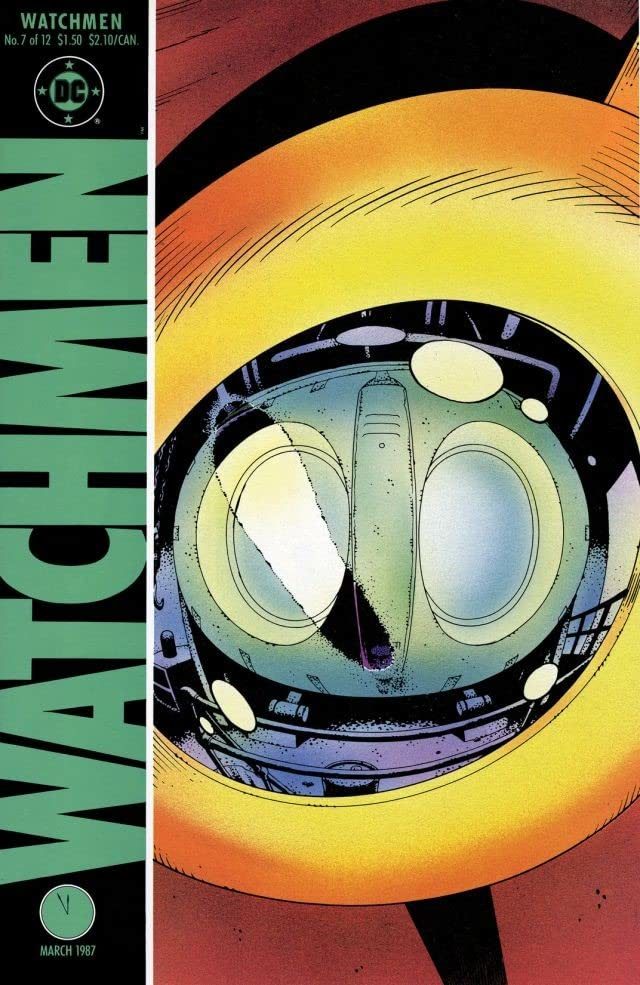 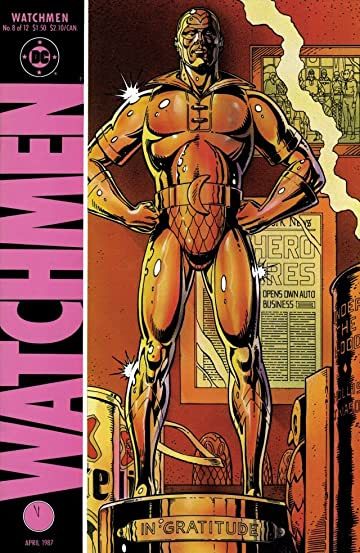 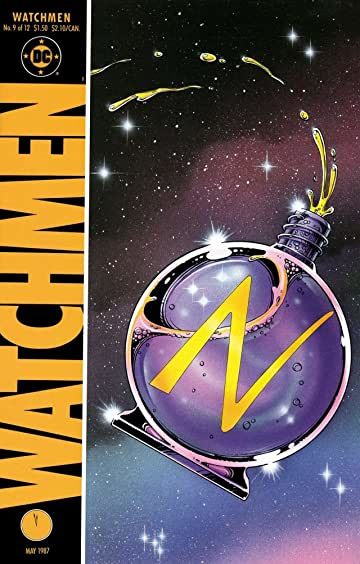 |
||
| Post 75 • IP flag post | ||
 COLLECTOR COLLECTOR
|
dielinfinite private msg quote post Address this user | |
Quote:Originally Posted by xkonk I think the answer to “why?” is at the very end of the issue on the note he clipped to the police file before he interviews Walter for the first time. I’m on a similar page on this as @michaelekrupp, though I’m not sure I would label him as an up-and-comer but this is certainly an opportunity for him. He mentions that he thinks interviewing him could help him discover a new syndrome with the possibility of future publication. So it seems like this is a career opportunity. He makes it clear that he doesn’t think he’s a model of a “good person,” casting doubts on the altruistic intention he tried to give Rorschach at first. Additionally, you can see a note on the file while Dr Malcolm is at home that says “One for you, Mal?” signed only with the initial “G.” So it sounds like it might have been passed on to him like a favor to a friend. I also wonder if “G” is someone we should know or will meet or if it’s just me diving too deeply. Quote: Originally Posted by xkonk I definitely noticed that as well but I think this issue really connected the psychology of Rorschach with Batman. Quote: Originally Posted by michaelekrupp Rorschach’s language certainly gives that impression and it reminded me very much of Batman’s monologue to Superman during their fight at the end of Miller’s Dark Knight Returns: 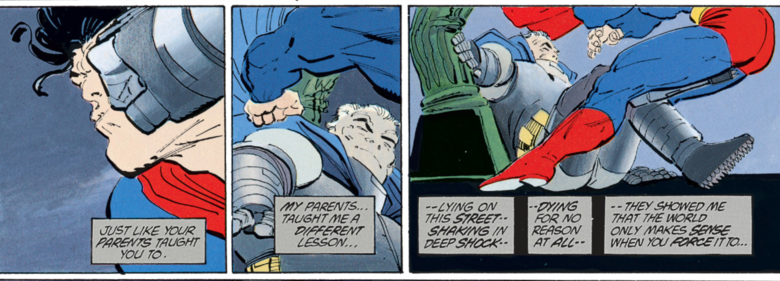 Though Nite Owl certainly seems more Batman-like on the surface with the money and the gadgets psychologically, Batman is Rorschach. This issue also touches on Rorschach’s brief encounter with the Comedian that we glimpsed at several issues back. While we don’t see more of the encounter we do get insight into Rorschach’s thoughts and why he might’ve characterized the Comedian’s attempted rape as a “lapse of morality.” It is pretty clear when Rorschach met the Comedian he admired him. Not because of his morality but because of a perceived dedication to a cause despite what others may think of him. I think some of that may have been imprinted a little later since Rorschach wasn’t Rorschach yet but after the child kidnapping that really made him he projects a lot of his worldview on the Comedian and describes him almost as a kindred spirit. The imagery of the graffiti from the previous issue is repeated several times. Rorschach had made a remark about how it appeared like two people in a sexual situation and in this issue we see Rorschach recalling that same image at the sight of an ink-blot and connecting it to his mother’s life as a prostitute. Doctor Malcom, upon seeing the graffiti links it to the shadows of Hiroshima victims. Seeing the “who watches the watchmen?” graffiti in Rorschach’s flashback got me thinking about the title of the book, which clearly is a reference to the question above. However, thinking of Doctor Manhattan’s flashback, I wonder if another interpretation of the title could be “Watch Men” as in those who make and repair watches, or to extend Doctor Manhattan’s metaphor, those who see and are carried by the invisible machinations of the universe. Quote: Originally Posted by xkonk I noticed a few typos in the text pages as well. If I were to ascribe a story-related explanation I would say it is trying to show a lack of attention to detail on the mental hospital’s part. The typo in young Walter’s report makes a bit sense considering his age at the time though I wonder if it was meant to be what he had actually written (how many people were typing their homework in the 50s?) or if it was a later transcription? I also have to wonder if they were just typos that got past an editor lol |
||
| Post 76 • IP flag post | ||
 If the viagra is working you should be well over a 9.8. If the viagra is working you should be well over a 9.8.
|
xkonk private msg quote post Address this user | |
Quote:Originally Posted by dielinfinite I understand why Malcolm might want the case; I don't understand how he got the case. Does he strike either of you as the kind of guy who has a history of talking to high-profile criminals, or multiple murderers? He gets absolutely destroyed in three days. Who would give him the chance and think he might succeed? I'll have to look back at the notes on the files again. Quote: Originally Posted by dielinfinite I think the typos were intentional; I definitely noticed a couple others. It's just that those were fairly common typos ("teh" or similar) but switching r and v seems odd. |
||
| Post 77 • IP flag post | ||
 COLLECTOR COLLECTOR
|
dielinfinite private msg quote post Address this user | |
Quote:Originally Posted by xkonk I don’t think he got it because he was the ideal person for the job. It seems like it was given to him because of his network connections. It’s not what you know, it’s who you know, and all that. I definitely agree that it seemed strange that a seemingly happy marriage breaks down after just three rough days and an uncomfortable dinner. You can imagine that they might have already had problems but that doesn’t necessarily seem to be the case. I kind of wonder if Moore knew what he wanted to show, and I’m sure the effects are not all that unrealistic, but didn’t want to compromise the rest of the story by having Rorschach being interviewed for weeks or months to affect the doctor’s personal life in a more realistic timeline. |
||
| Post 78 • IP flag post | ||
 If the viagra is working you should be well over a 9.8. If the viagra is working you should be well over a 9.8.
|
xkonk private msg quote post Address this user | |
| I read issue 7 last night. Not a lot really jumped out at me. To the extent that the odd number issues are more focused on plot, this one is all about Dan and Laurie getting together and back into heroics. We do learn more about Dan's history and personality, but it isn't nearly the deep dive that we got with Manhattan, Rorschach, or the Comedian. There is a bit of personality/character discussion when it comes to Dan's impotence though. I didn't remember that they highlight it so explicitly as being about the costumes, but they certainly do. There's also some parallelism with the commercial for Nostalgia and Ozymandias' performance on TV that are less than flattering for Dan (and maybe Laurie, although she seems less obviously the target). Dan seems somewhat stuck in the past, and maybe Laurie too, and they're trying to recapture the feeling of when they were younger crimefighters. Ozymandias' performance (even in his 40s!) is smooth and perfect while Dan's is anything but. |
||
| Post 79 • IP flag post | ||
 If the viagra is working you should be well over a 9.8. If the viagra is working you should be well over a 9.8.
|
xkonk private msg quote post Address this user | |
| I read issue 8 yesterday and assumed I would get to 9 today but didn't. Issue 8 breaks my (probably a stretch in the first place) character/plot alternating pattern. Kind of unfortunate as far as this series goes, because the character issues provide so much more to discuss and think about. But here we get the big jailbreak, where Rorschach demonstrates that everyone really was locked in there with him. It ends on a sad note though, properly forecast by the Black Freighter reappearing, with the misguided death of Hollis Mason. I'm not sure if there's a greater lesson to the plot point besides the cruelty and ignorance of some people. Going outside the book, the jailbreak was probably my favorite part of the Watchmen movie (from what I remember) Jackie Earl Haley did a great job as Rorschach and he was unmasked for the set piece. Maybe my memory is faulty again, but I feel like Dan and Laurie did some fighting here, but they don't in the issue. I think I saw that the movie is free with Amazon Prime; I'll have to give it a watch soon. Anyone know if the director's edition is worthwhile? |
||
| Post 80 • IP flag post | ||
This topic is archived. Start new topic?

